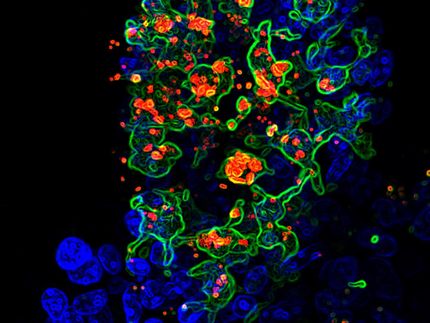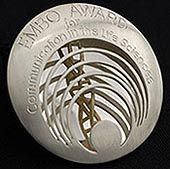Cornell partners on 'Library of Life'
Cornell and Stanford to work with Israel and Jordan on Bridging the Rift research center to include world's first databank for all living systems
N.Y. -- On March 9, Cornell University will participate in a groundbreaking ceremony 50 miles south of the Dead Sea, on the border between Israel and Jordan. Land donated by each country will be joined to form a 150-acre site for a research facility, the Bridging the Rift (BTR) Center, which will include the world's first databank of information about all living systems.
The databank will be the core of the facility's centerpiece, the Library of Life, led by Cornell and Stanford University scientists who will gather, organize and model information to quantify and characterize all living systems. The library will be a research and education center operating a databank, yet to be developed, that will assemble information on living systems, from microbes to plants to animals, using digital images and global positioning data. Information also will flow from ecological and environmental investigations, molecular research and DNA sequencing.
The research center will develop computer modeling systems to make predictions at genetic levels and to help understand coevolution of species and the ways in which ecology affects DNA, and the reverse. Both Cornell and Stanford will offer doctoral degrees at the BTR Center.
Cornell President Jeffrey S. Lehman, who will attend the ceremony at the border site (it is known as central Arava on the Israeli side and Wadi Araba on the Jordanian side), says, "This project is an enormous undertaking, one that will require the collaboration of scientists from every corner of the world. We are grateful that the governments of Israel and Jordan have taken the first steps to show how this collaboration can evolve. This is a unique scientific environment, the perfect place to begin the project."
Because the new databank will gather a hugely diverse amount of information about living systems, it will be a major advancement over GenBank, the database operated by the National Institutes of Health in the United States. GenBank, which stores genetic sequences, is part of the International Nucleotide Sequence Database Collaboration, which also includes the DNA DataBank of Japan and the European Molecular Biology Laboratory.
The Library of Life was proposed by Steven Tanksley, the Liberty Hyde Bailey professor of plant breeding at Cornell, who will be a key adviser on the project. The library's director will be Ron Elber, professor of computer science at Cornell. The early work of the library will be to develop a prototype, the Library of the Desert, which will be a digital catalog that includes living samples of microbes, fungi, plants, insects, invertebrates and vertebrates in the Dead Sea region. New computer languages and databases will be created to integrate the massive amounts of data flowing into the library.
BTR Foundation, which is providing seed money for the BTR Center is headed by New York City businessman Mati Kochavi, a native of Israel who is chairman of Optic Solutions.
This is Cornell's second teaching and research initiative in the Middle East. Last year, the Weill Cornell Medical College in New York City opened a campus in Qatar, the first higher education institution in that country to be coeducational. Cornell is the first American university to offer its M.D. degree overseas.
Much of the research in the Library of Life, as at the BTR Center itself, will involve the challenges presented by the completion of the Human Genome Project, in which the basic fingerprints of humans, the DNA sequences, have been recorded. In future decades researchers will attempt to unravel biological functions and discover medical benefits. This, however, is only a small part of the information that is necessary to understand life. Of the 20 million known species on Earth, only a tiny fraction of genomes have been sequenced. And genomes do not code ecological relationships and complex environmental effects, which need to be recorded and modeled separately.
Cornell University is one of a handful of universities in the world making investments in excess of $500 million to modernize life sciences research and education programs. Through its New Life Sciences Initiative, Cornell is engaging several hundred researchers across its campuses in Ithaca and at the Weill Cornell Medical College in New York City in a broad program of education and investigation, integrating life sciences with physical, engineering and computational sciences.
Steven Tanksley, the Liberty Hyde Bailey professor of plant breeding at Cornell University, says that the collection of data at the Library of Life is expected to take decades, by many research groups throughout the world. "Future advances in medicine, agriculture and environmental sciences will critically depend on the Library of Life," he says.
Tanksley says that collecting, cataloging and connecting data "will evolve into the new basis for creativity and discoveries about the origins, mechanisms and interconnectedness of life forms, and from that information we will embark on a new future on how we feed and clothe ourselves.
This information will also expand and, in some ways, change how we view ourselves, as the human species, in the larger context of life and the universe."
The library's director, Ron Elber, professor of computer science at Cornell, says that the aim of the library is to assemble a digital catalog and living samples of all microbes, fungi, plants, insects, invertebrates and vertebrates in the region, creating a Library of the Desert. It is because the desert environment is not rich in life forms that comprehensive analysis of life sciences for this specific environment might be feasible in a relatively short time, he says. "This is important since the Library of Life will need to show some tangible outcomes in a few years. Hence, besides the obvious economical and ecological benefits to the region, the Library of the Desert will provide a prototype for the Library of Life and will sketch the structure for libraries of other regions richer in alternative life forms and more challenging to handle."
The complex nature of the data, he says, will require the development of new software and new database systems. "We will need to handle new information at an unprecedented scale as well as to integrate many existing databases. This is a very major undertaking -- besides the obvious challenge of collecting the data."
Making the Library of Life's huge data set accessible over the Web also will require a number of technical breakthroughs. A new language will be created integrating classification schemes of different life science disciplines, making it easy to navigate between the biology of the small and of the large. "The ties between biology and the information sciences have always been deep; this project will generate many hard questions for computing and information science, and provide opportunities to apply our technology to meeting basic human needs," says Robert Constable, dean of the Faculty of Computing and Information Science at Cornell. "We will be challenged to find ways to integrate the many databases being created for the life sciences and to organize them to facilitate problem solving, discovery and education."
To enable this rapid exploration of data and comprehensive mathematical modeling of life on Earth, data structures and query languages will be created, guided by a think tank of Cornell researchers -- in time to include experts from around the world -- in the biological, computer and physical sciences. For example, the large-scale data integration will make it possible computationally to examine the effects of drug molecules on their environment and ecology.
Cornell's wide-ranging experience in international education and research springs from its pioneer work in agricultural development in what is now Nanjing University, China, in the early 20th century. In the Philippines, Cornell helped form the University of the Philippines Los Baños and assisted in the rebuilding of the country's agricultural system after World War II. In Uganda in the 1990s, Cornell, with World Bank support, coordinated and administered the external degree component of a program to enhance the human resource development of Uganda's universities. Cornell has U.S. Department of Agriculture grants in Armenia, Honduras, Thailand and South
Africa, as well as Ford, Rockefeller and Hilton foundation-funded initiatives in Africa and Asia, and some 25 international collaborative projects in Madagascar and Ethiopia.



















































